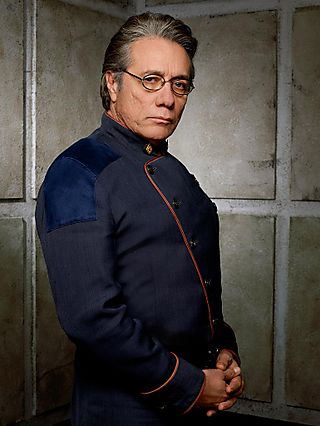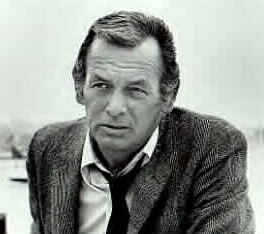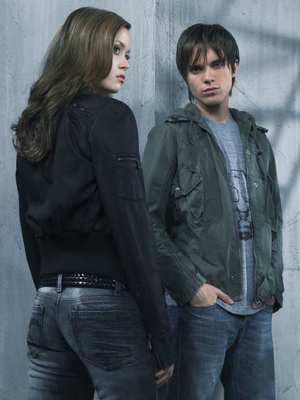
I finished writing my latest MONK novel the other day and I felt like lazing around. I’ve had a lot on my mind lately and after writing a book I didn’t feel much like reading one. So I vegged out on television…some new, some old.
The “new” were the latest episodes of BATTLESTAR GALACTICA and TERMINATOR: THE SARAH CONNOR CHRONICLES.
The BATTLESTAR episode was, astonishingly, one hour of pure exposition…mightily well-written, grandiose and flowery exposition, but exposition all the same….the dreaded “Irving the Explainer” taken to new, galactic heights by three Cylon-the-Explainers. Only a serialized series on it’s last episode or two that doesn’t give a damn anymore about drawing new viewers would dare film an episode like that and call it entertainment (though Marc Bernardin at Entertainment Weekly thought it was so “revelatory” that it “melted my Goddamn face off.”)
The TERMINATOR episode was merely dull and totally uninvolving, relying heavily on the over-used trick of having the hero (or in this case, heroine) talk to an imaginary character. Alan Ball should be shot for doing it so effectively on SIX FEET UNDER because now every TV series has to do it. Nobody seems to have noticed that it became a cliche three years ago and is now slipping into unintentional parody. At least the folks on GREY’S ANATOMY have raised the stakes by having the heroine fuck the character who isn’t there…oh, wait, I take it back, GALACTICA did that two seasons ago when it still had a sense of humor to go along with all of its dread and misery. The folks at TERMINATOR have forgotten what made the TERMINATOR movies so much fun…and have gotten mired in dreary angst…probably because angst is cheaper to shoot than Terminators destroying things. The John Connor character has become a morose, whiny, Excedrin headache come-to-life…but the two lady Terminators? They’re great.
The “old” TV that I watched was a private eye marathon that I staged for myself with episodes of HARRY O starring David Janssen, THE OUTSIDER starring Darren McGavin and THE ROCKFORD FILES starring James Garner.

THE OUTSIDER and ROCKFORD were, essentially, the same show, about a down-and-out ex-con turned private eye in L.A. Roy Huggins created THE OUTSIDER and co-created ROCKFORD with Steve Cannell, who brought more humor to the concept. I liked all three of them very much ..not so much for the plotting, which was often weak and predictable, but for the mood and the terrific anti-private eyes at the heart of those series (and the brilliant lead actors who played them). Nobody did world-weary heroes and lovable losers like McGavin, Janssen and Garner. It’s hard to pick a favorite among these three great series, but if I had to, I guess it would be HARRY O.
Janssen is a pleasure to watch as beach-bum Harry Orwell, riding around San Diego on the bus, tie loose around his collar, a permanently pained expression on his tan, lined face. What a terrific character. Both Rockford and Ross were tougher than they looked, but not Harry. He wasn’t tough at all. Just bone-tired and lonely…and too caring for his own good. He couldn’t even run after a bad guy or a damsel in distress, not with that damn bullet permanently stuck in his aching back. What other private eye but Harry would turn down a willing Linda Evans by saying “I can’t make love unless I’m in love…just a little.” Ross and Rockford would have bedded her in a second…out of desperation and opportunity if nothing else. Not Harry.
Sure, the plotting in HARRY O was often lousy, but the show captured, better than any other before or since, the pure pleasure of reading a great PI novel. The show wasn’t as complex as a Ross MacDonald or even John D. MacDonald novel, but it aimed for that kind of emotional and psychological complexity…even when it pandered with a drooling psychokiller plot (starting with it’s pilot, “Smile Jenny, You’re Dead”).

Watching HARRY O, ROCKFORD and THE OUTSIDER, I realized what those old shows had over those two, recent episodes of GALACTICA and TERMINATOR. Character. Keep in mind, GALACTICA and TERMINATOR are two of my favorite shows (well, they were). But, at the risk of sounding like an old coot blogging from his bungalow at the Motion Picture Home, I think that too often shows today confuse angst with character, dread with depth, misery with complexity. A character doesn’t have to be in endless spasms of self-loathing, denial, heart-break and agony to be someone worth watching or caring about. That’s cheap and easy “complexity” for a writer, it’s writing a character rather than creating one…and it’s a beating for the audience. Characters are more than the sum of their pain, anguish and loss…and their capacity for cruelty to themselves and others. It’s not superficial or weak writing to explore more subtle conflicts…and to season them with humor, compassion, vulnerability, and some joy. There are people I love very much who are going through very hard times…and yet they haven’t lost their sense of humor or their ability to find joy in their lives, even in their darkest moments. If anything, it’s that capacity for humor and joy that is seeing them through it.
I love (or, I should say, loved) GALACTICA and TERMINATOR…but Captain Adama and Starbuck, Sarah Connor and John Connor….in the end, they aren’t memorable characters. They feel like writerly constructs. Pain masquerading as character. They don’t live and breath the way Lt. Columbo, Tony Soprano, Archie Bunker, Adrian Monk, Al Swearingen, Mr. Spock, Mary Richards, Matt Dillon, George Costanza, or even Dexter Morgan do, to name a few. Because despite all of the dark, angst-ridden conflicts that the writers have created for them, the characters on GALACTICA and TERMINATOR are incessantly one-note: Miserable. And too often than not, they leave the viewer feeling the same way.

Which MONK book did you finish writing? Is it MR. MONK IN TROUBLE?
Have you checked out any of the new shows? I watched Dollhouse on Friday and I don’t know if I care enough to give it another go next Friday. I really like Lie to Me with Tim Roth on Fox. Any thoughts or comments?
I wonder if part of the reason for the move to one-note characters is the change in TV viewing habits. When families gathered around the tube to watch a show at the same day and time each week, characters had to have some charm — because you wouldn’t invite some endlessly morose schlamazal into your living room for company every Sunday evening. Now that TV shows can be watched any time, in a multitude of formats, show creators may feel less pressure to make characters charming, or even interesting.
“”I think that too often shows today confuse angst with character, dread with depth, misery with complexity. A character doesn’t have to be in endless spasms of self-loathing, denial, heart-break and agony to be someone worth watching or caring about. That’s cheap and easy “complexity” for a writer, it’s writing a character rather than creating one…””
Lee, this may be one of the single best thing statements on today’s television writing I have ever heard/read.
And to Lee’s readers – the above line isn’t something Lee preaches without practice. Credits in television are like stats in sports – OVERRATED.
Just because Lee doesn’t have the shiny Emmy type credits like Sopranos or NYPDB, doesn’t mean he isn’t very talented. And though he is a plotting machine, I think Lee’s greatest strength as a writer is character, and I believe nothing is more important in television.
Aspiring writers (as well as seasoned ones) should read this post again and again to drill it into their heads what the ultimate goal should really be.
Well done, Goldy.
That’s my new name for Lee. Goldy. Because I don’t want him getting too big an ego.
When it comes to creating interesting characters, I like Gilbert Ryle’s essay on Jane Austen’s method. She has a continuum with one end the negative quality and the other end the positive quality. The novel, itself, is like a debate between the two. And each character has the continuum inside, so that each is composed of some ratio of the two. In PRIDE AND PREJUDICE, D’Ary has too much pride. But Elizabeth has a mistaken opinion about him. So when he overcomes his pride and changes his mind about her, she can overcome her prejudice and change her mind about him. The plot is really good because the main characters are learning and changing as they go. They move along the continuum. The minor characters are stuck at their particular ratio and can’t change. So Jane Austen’s basic THEME is that TO ACHIEVE HAPPINESS WE NEED TO BE ABLE TO DISCARD MISTAKEN ASSUMPTIONS, IDEAS AND ATTITUDES. One of these is that AUTHORITY KNOWS BETTER. Instead, she asserts that each individual needs to cross whatever boundaries are in the way in order to achieve true love. (When she was writing, 1795 to 1817, this was a somewhat daring and radical idea.)
Current TV shows seem to place the CONFLICT outside the CHARACTERS. This is okay but it can never be as interesting as watching a CHARACTER struggle against themself. On the other hand, we don’t want James Bond to be contemplating his navel for two hours. Anyway, I guess in TV-LAND a James Garner doesn’t come along very often. How often in Western Culture has a Shakespeare or a Tolstoy come along? I guess the minor talents sure look minor when compared to the great talents!
HARRY O is my all time favorite t.v. show. Where did you get the copies and how can I get them?
RJR
I haven’t seen LIE TO ME or DOLL HOUSE yet.
I have seen the first three episodes of LEVERAGE and enjoyed them a lot. It’s pure escapist fun and there aren’t a lot of shows on TV that dare to be that any more. And the lead character, despite having a “dark” back story, isn’t dreary and miserable…he enjoys what he does and has fun doing it, even if his driving motivation stems from tragedy. Yes, it’s possible to have tragedy in your life and still have a sense of humor. I’ll have to catch up on the rest of the episodes…
Lee
Ironically, I think the endlessly serialized nature of current drama shows turns out to hurt the characterizations. There is almost a competition as to whose show can have the most Byzantine plot machinations, and all the time and effort is spent on weaving the story threads together, and then unraveling them in lengthy, expository explanations. Older shows had continuing plots, but they were never in the forefront. Sure, Dr. Richard Kimble always had to worry about Lt. Gerard and finding the one-armed man, but he had time to do lots of other stuff in the meantime. In the first three years of the show, I think the one-armed man shows up four times, including twice in flashbacks. Today, he would be in the opening credits, and have to appear in every episode.
When dramas are aired as stand-alone stories, the characters are what draw people back next week. Also, there is time for characterization. Columbo, for example, was a wonderfully plotted show, but the utter lack of continuing story allowed each show to be a two-character psychodrama, as well as a mystery story. To use your examples, we get to know Harry Orwell and Jim Rockford over time because they have believable, yet unique, responses to all the action that happens. It’s like knowing your friends…You don’t understand them because they have a long monologue about why they are the way they are. You understand them because you see them in the real world, and you see how they act and react to different things.
The other difference I have noticed in newer TV dramas is scene length. Scenes have gotten so short and so heavily edited, that it feels there is no time to get to know any characters. Take two not dissimilar shows at heart: Remington Steele and Bones. Clock the average scene length for a given episode of each. I like Bones fine, but the character relationships seem so much less complex than on Remington, partly because they never have more than 45 seconds at a time to talk to each other.
Lee, do you find yourself pressured to write differently now than when you started? Monk, for the most part, is immune to these criticisms. (And I do classify it as a drama, whatever the Emmy submissions are meant to have us believe.) Do the producers have to fight to maintain that status?
Sir,
Your essay reminds me of an Ursula LeGuin quote. (I’m paraphrasing) “it’s the treason of the artist, only pain is interesting, only evil complex.” Maybe only evil interesting, pain complex. But you get the point.
So true, Lee! And this unfortunate trend isn’t only confined to television, either. I have been seeing it up on the big screen, too — particularly in all of the dark and faux-angsty comic book movies burning up the box office lately.
The problem: Today’s filmgoers simply can’t distinguish between the solemn, and the profound.
And boy is there a difference. After all, just because the hero is brooding, the lighting-scheme dark, and the jokes scarce, THAT DOESN’T MEAN YOU’RE DOING FRIGGIN’ EUGENE O’NEIL!!!
Now, am I saying that filmmakers ought to be “camping things up” a little bit? No way. As a general rule, I HATE camp.
But when you start running around treating THE ADVENTURES OF ROBOT GIRL like it was KING LEAR or something, you risk having the entire bloody enterprise come off looking more, not less, absurd. At least to me.
Then again, maybe I’m just showing my age…
My other point…
Holy crap, Lee! Did I read you correctly? You’d put HARRY O over ROCKFORD? That’s sacriledge!
ROCKFORD’s just about the best PI show ever made, or at least it’s supposed to be.
Is HARRY O that wonderful? (I’ve never actually seen it)